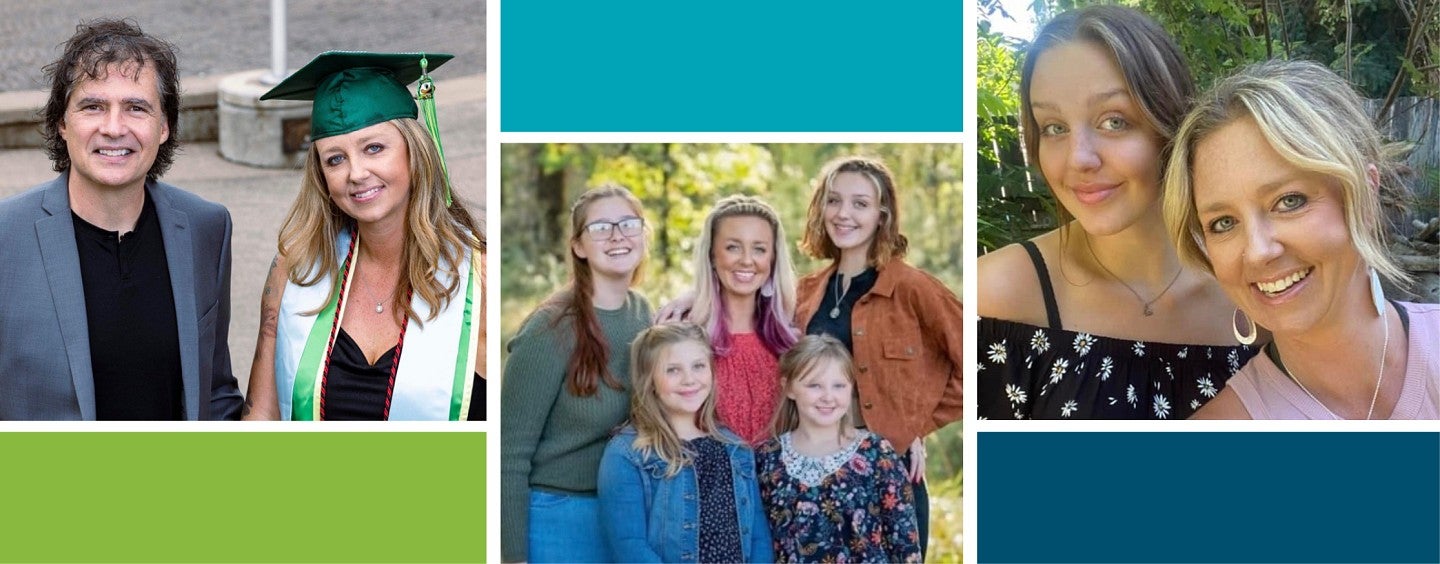Read how Randi Ross used her experiences of trauma to help others

Images from left: 1) Randi Ross with her UO mentor, Jeff Todahl; 2) Ross with her four girls; 3) Ross and her eldest daughter, Karlie, who will serve as a youth mentor for Vital Villages.
By the time Randi Ross arrived at the University of Oregon, she was ready to turn her trauma into action. A survivor of molestation in childhood, domestic abuse as an adult, and a witness to how predators had begun targeting her own children, Ross entered UO with a resolute mission: To put a stop to the generational cycle of child abuse.
She wasn’t exactly sure how she would do it, but she did know from experience that existing systems needed work.
“The way the system was structured, it was super, super shameful,” she said.
Every time she reached out for help, she was met with sterile paperwork and little human support. Services were also piecemeal and each took significant time and energy to pursue.
Motivated by the promise of a better way, Ross earned a Master’s in Prevention Science from UO. She then started laying out the framework for the type of program she wished existed in her time of need.
“My ultimate goal was Vital Villages,” said Ross, “And it all stemmed from experience, every single experience in my entire life.”
Vital Villages is an innovative social services program that Ross designed. In April of 2023, the program received a $114,000 South Lane Grant from the Yarg Foundation to launch.
The program will provide wrap-around services to families in Cottage Grove. Ross will serve as the primary point of contact and navigator for parents. Her eldest daughter will serve as the youth mentor for children. Ross is completing strategic planning in advance of the official launch in January of 2024.
Ross and her daughter will meet with participants in their homes to simplify service delivery. For the first half of the six-month program, they will focus on bringing stress levels down and listening to the needs of the participants.
“I'm not going to come in and be the expert to tell them what they need to do,” said Ross. “They're the expert of their own story.”
But she will make connections and give suggestions from a trauma-informed lens. The goal is to build a genuine relationship of trust and understanding.
“I truly believe you can give people all the money and food and housing that they need,” said Ross, “but if they don't feel belonging or valued, or believed in or loved, they're not going to be able to thrive out of that.”
Once a strong relationship is formed and immediate needs are met, participants will move to the second part of the program. Focus areas include goal setting, skill building and standing up a long-term community village on which participants can rely.
Vital Villages will host monthly dinners to bring people together. Participants will focus on mental health and processing of grief and loss though a program called Emotional Logic out of the UK. There will be a property where families can go to interact with animals and decompress in nature. And participants will be able to access free legal advice.
The program arc mirrors Ross’ own road to recovery from trauma. The most important piece was having someone who believed in her. For Ross, that was Jeff Todahl, an Associate Professor at UO.
“Not only did he mentor me, but he believed in me,” said Ross. “It was that piece of belief that I was missing.”
Todahl is on the Advisory Committee for Vital Villages. He is helping to operationalize Ross’ vision and will continue to be involved as the program matures. He is not surprised by how Ross has been able to bring the program to fruition.
“Her ability to vision with action, perseverance, enthusiasm and transparency — all those things come together in powerful ways in Randi,” he said.
She is also being intentional about integrating the program into the larger social service ecosystem both locally and at the state level, which Todahl said is critical to sustainability.
“It's not simply an island,” said Todahl, “it's meeting the need locally, but it is connected to a larger statewide effort.”
As painful as her journey was, Ross can look back on it now with peace knowing that her program will help make things easier for others.
“I wouldn't be anywhere without all the things that I've gone through,” she said. “Everything comes full circle. It just comes full circle like that.”
—
Acknowledgements: Many organizations and individuals have contributed to the early success of Vital Villages. Thank you to Trust The Balance for being a fiscal sponsor; AWARE Consulting Group for partnering in the delivery of trauma-informed care; and members from South Lane Mental Health, South Valley Athletics, Cottage Grove Faith Center, Earth and Social Justice, South Lane School District, and Oakridge School District for sitting on the Vital Villages Advisory Board.
-By Claire Shanley, Division of Graduate Studies
